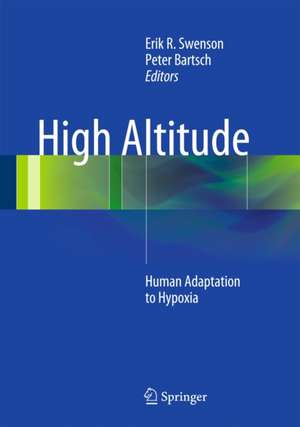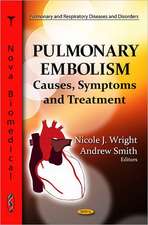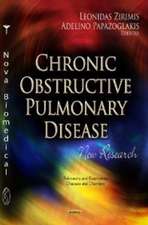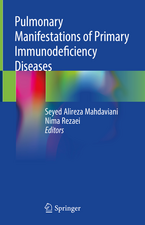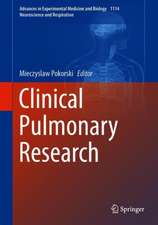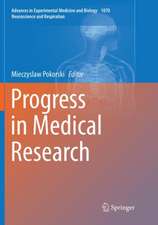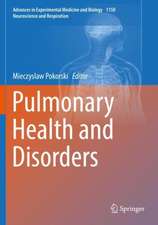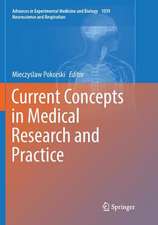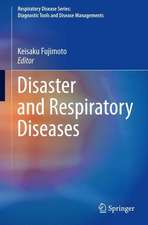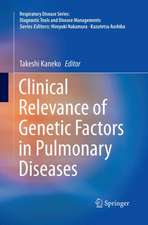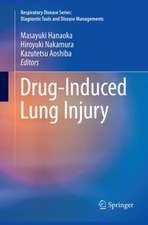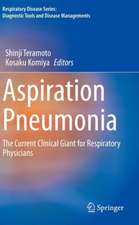High Altitude: Human Adaptation to Hypoxia
Editat de Erik R. Swenson, Peter Bärtschen Limba Engleză Hardback – 25 noi 2013
| Toate formatele și edițiile | Preț | Express |
|---|---|---|
| Paperback (1) | 1175.78 lei 6-8 săpt. | |
| Springer – 22 aug 2016 | 1175.78 lei 6-8 săpt. | |
| Hardback (1) | 1626.03 lei 6-8 săpt. | |
| Springer – 25 noi 2013 | 1626.03 lei 6-8 săpt. |
Preț: 1626.03 lei
Preț vechi: 1711.62 lei
-5% Nou
Puncte Express: 2439
Preț estimativ în valută:
311.13€ • 324.88$ • 256.93£
311.13€ • 324.88$ • 256.93£
Carte tipărită la comandă
Livrare economică 16-30 aprilie
Preluare comenzi: 021 569.72.76
Specificații
ISBN-13: 9781461487715
ISBN-10: 1461487714
Pagini: 596
Ilustrații: XI, 496 p. 92 illus., 16 illus. in color.
Dimensiuni: 178 x 254 x 25 mm
Greutate: 1.09 kg
Ediția:2014
Editura: Springer
Colecția Springer
Locul publicării:New York, NY, United States
ISBN-10: 1461487714
Pagini: 596
Ilustrații: XI, 496 p. 92 illus., 16 illus. in color.
Dimensiuni: 178 x 254 x 25 mm
Greutate: 1.09 kg
Ediția:2014
Editura: Springer
Colecția Springer
Locul publicării:New York, NY, United States
Public țintă
Professional/practitionerCuprins
High Altitude: Human Adaptation to Hypoxia:
1. Cellular and Molecular Mechanisms of O2 Sensing
Paul T. Schumacker
2. Cell and Molecular Defenses Against Hypoxia
Stilla Frede and Joachim Fandrey
3. Control of Breathing
Luc J. Teppema and Remco R. Berendson
4. Lung Function and Gas Exchange
Andrew M. Luks and Susan R. Hopkins
5. Pulmonary Circulation
Marco Maggiorini, Peter Bartsch, and Erik R Swenson
6. Cardiovascular System
Aaron L. Baggish, Eugene E. Wolfel, and Benjamin D. Levine
7. Cerebral Circulation and Brain
Philip N. Ainslie, Mark H. Wilson, and Christopher HE Imray
8. Autonomic Nervous System
Roger Hainsworth, Mark J. Drinkhill, and Victoria E. Claydon
9. Skeletal Muscle
Hans Hoppeler, Matthias Mueller, and Michael Vogt
10. Blood and Hemostasis
Peter Bärtsch and Jim Milledge
11. Renal Function and Fluid Balance
Erik R. Swenson and Niels V. Olsen
12. Endocrine Function
Jean-Paul Richalet
13. Gastrointestinal Function
Noor Hamad and Simon Travis
14. Immune System
Robert S. Mazzeo and Erik R. Swenson
15. Nutrition and Metabolism
George A. Brooks
16. Exercise
Carsten Lundby
17. Sleep
Yvonne Nussbaumer-Ochsner and Konrad E. Bloch
18. Reproduction and Growth
Susan Niermeyer
19. Human Evolution at High Altitude
Cynthia M. Beall
20. Acute Mountain Sickness and High-Altitude Cerebral Edema
Peter Bärtsch and Damian Miles Bailey
21. High-Altitude Pulmonary Edema
Robert B. Schoene and Erik R. Swenson
22. Subacute and Chronic Mountain Sickness
Fabiola León-Velarde S, María Rivera-Ch, and Francisco C. Villafuerte
23. High Altitude and Common Medical Conditions
Andrew M. Luks and Peter H. Hackett
1. Cellular and Molecular Mechanisms of O2 Sensing
Paul T. Schumacker
2. Cell and Molecular Defenses Against Hypoxia
Stilla Frede and Joachim Fandrey
3. Control of Breathing
Luc J. Teppema and Remco R. Berendson
4. Lung Function and Gas Exchange
Andrew M. Luks and Susan R. Hopkins
5. Pulmonary Circulation
Marco Maggiorini, Peter Bartsch, and Erik R Swenson
6. Cardiovascular System
Aaron L. Baggish, Eugene E. Wolfel, and Benjamin D. Levine
7. Cerebral Circulation and Brain
Philip N. Ainslie, Mark H. Wilson, and Christopher HE Imray
8. Autonomic Nervous System
Roger Hainsworth, Mark J. Drinkhill, and Victoria E. Claydon
9. Skeletal Muscle
Hans Hoppeler, Matthias Mueller, and Michael Vogt
10. Blood and Hemostasis
Peter Bärtsch and Jim Milledge
11. Renal Function and Fluid Balance
Erik R. Swenson and Niels V. Olsen
12. Endocrine Function
Jean-Paul Richalet
13. Gastrointestinal Function
Noor Hamad and Simon Travis
14. Immune System
Robert S. Mazzeo and Erik R. Swenson
15. Nutrition and Metabolism
George A. Brooks
16. Exercise
Carsten Lundby
17. Sleep
Yvonne Nussbaumer-Ochsner and Konrad E. Bloch
18. Reproduction and Growth
Susan Niermeyer
19. Human Evolution at High Altitude
Cynthia M. Beall
20. Acute Mountain Sickness and High-Altitude Cerebral Edema
Peter Bärtsch and Damian Miles Bailey
21. High-Altitude Pulmonary Edema
Robert B. Schoene and Erik R. Swenson
22. Subacute and Chronic Mountain Sickness
Fabiola León-Velarde S, María Rivera-Ch, and Francisco C. Villafuerte
23. High Altitude and Common Medical Conditions
Andrew M. Luks and Peter H. Hackett
Notă biografică
Erik R. Swenson, MD is a professor in the division of Pulmonary and Critical Care Medicine at the University of Washington. His research interests include adaptation and maladaptation in animals and humans to high altitude hypoxia: renal and pulmonary responses with emphasis on acute mountain sickness and high altitude pulmonary edema. Peter Bartsch, MD has participated in many field studies in the Alps, investigating the physiology, prevention and treatment of acute high altitude illnesses. From 1984 to 1989, he ran high altitude research projects at the Inselspital Bern, in co-operation with Oswald Oelz, and in 1990, he led the Exercise Physiology Laboratory at the Swiss School of Sports. In 1991, he was appointed Professor of Sports Medicine at the University of Heidelberg where he is currently the head of the Division of Sports Medicine. Peter Bartsch
Textul de pe ultima copertă
Over the last decade the science and medicine of high altitude and hypoxia adaptation has seen great advances. High Altitude: Human Adaptation to Hypoxia addresses the challenges in dealing with the changes in human physiology and the particular medical conditions that arise from exposure to high altitude. In-depth and comprehensive chapters cover both the basic science and the clinical consequences of exposure to high altitude. Genetic, cellular, organ and whole body system responses to high altitudes are covered and chapters discuss these effects on a wide range of diseases. Expert authors provide insight into the care of patients with pre-existing medical conditions that fail in some cases to adapt as well as offer insights into how high altitude research can help critically ill patients. High Altitude: Human Adaptation to Hypoxia is an important new volume that offers a window into greater understanding and more successful treatment of hypoxic human diseases.
Caracteristici
Written by an international group of expert authors
In-depth and comprehensive chapters cover both the clinical aspects and basic science of Hypoxia
Important new volume that offers a window into greater understanding and more successful treatment of hypoxic human diseases
In-depth and comprehensive chapters cover both the clinical aspects and basic science of Hypoxia
Important new volume that offers a window into greater understanding and more successful treatment of hypoxic human diseases
